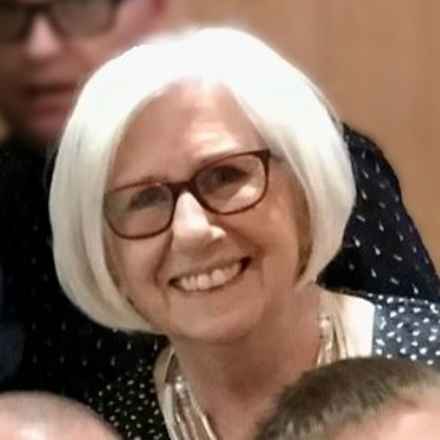"I didn't know if my hallucinations were a manifestation of my grief"
Posted: Thursday 16 November 2023
Seeing frightening faces in her own home was the reality for Penny, who was trying to come to terms with her sight loss in the aftermath of losing her husband.
Little did she know that she was experiencing these hallucinations because of her macular disease – a condition called Charles Bonnet syndrome (CBS).
The last few years have been a challenge for Penny, whose husband Doug passed away in 2020, before she was diagnosed with wet age-related macular degeneration (AMD) the following year.
“I felt numb with more grief,” said the 76 year old from County Durham. “It just seemed like one more thing because loss was already all around me, so it was very difficult.”
Reading had also become more difficult, while wavy lines appeared on TV when they were in fact straight.
Penny said: “It was a dark time in my life and things just didn't seem to be going right for me. I was trying to cope without my husband and then thinking about how I would cope if I lost sight because I think that was my biggest fear.”
Then the following year, in 2022, Penny began to see things which weren’t real. With no knowledge of what CBS was, she could not comprehend the terrifying visions.
Marking Charles Bonnet Syndrome Awareness Day 2023, Penny said: “Grief does funny things to people, so I didn't associate what I experienced as part of my sight loss. I was seeing lace patterns and scary faces, which had dark features, but they weren’t overly clear.
“It certainly wasn't anything that you would recognise as a person, but it didn't quite have clear features, more like a silhouette.
“I had to double take. From then it tended to be at night and I thought I was going crackers.”
She added: “Seeing the silhouette face, my heart was beating fast and I held my breath, I didn't scream or anything, but it was just a moment of panic. I didn't know if it was real or if it was kind of a manifestation of my grief, but I was scared frozen.
“At first I thought, am I half asleep? Am I dreaming? I didn't know quite how to react. You kind of stay still and just keep on looking. But nothing bad happened. The images were just there but I didn’t know what was going on.”
Charles Bonnet hallucinations are not a sign of mental illness and speaking to a counsellor one-on-one was a game changer. Through the Macular Society’s counselling service Penny was able to find out more about the condition, as well as express other concerns related to her treatment for wet AMD.
She said: “My world doesn’t seem so dark now. I was completely conflicted when I rang the Macular Society about what was happening and how I felt, and I got reassurance knowing that I could speak to someone who understood me and I could trust them.”
Penny is far from alone as up to half of all people with macular degeneration are thought to experience visual hallucinations at some point. And, although there can be similarities, they often present differently to each person.
’Maybe I shouldn’t laugh, but they are hilarious’
Wendy, 47 from York, has described her own dancing-themed visions which she experienced after she was diagnosed with AMD.
Wendy said: “I'm very sensitive to the light, so if anything flashes or if there are any bright lights, that’s when the hallucinations start and I have to giggle when I get them. Maybe I shouldn't laugh but they’re hilarious to me. I remember when I was in the hospital and I kept seeing this hippo, a teddy bear and an elephant dancing the Tango. I was trying to keep a straight face while I was having my tests done!
“At first I would get flashes and floaters, then I started to see tadpoles with a sharp knife. I was scared, I was worried because I thought ‘I’m not right here’ but I told doctors at the hospital and that’s when I was given leaflets of information and my journey started there.”
Talking about your experiences
Both Wendy and Penny have been able to speak to professionals about their different experiences of CBS.
While Penny had counselling from the Society, Wendy has been supported by Esme’s Umbrella, a charity dedicated to helping people with Charles Bonnet hallucinations.
Encouraging others to speak out and seek support, Wendy said: “You're scared of the unknown but actually reading about what’s happening to you really helps. It might sound scary at first but reaching out and talking to other people with sight loss helps because they might have Charles Bonnet or know about it too. That will help you understand what is happening to you.”
Managing hallucinations
Research is taking place to find out more about Charles Bonnet syndrome, including which techniques are best to manage them when they appear.
And while everyone is different, Wendy has found comfort in controlling the lighting around her.
“If you have a low light on, that might help enable you to see without the bright lights which can trigger these images, or when you do see something then move your eyes to the side, that helps me to get rid of my hallucinations,” she said.
For support with your macular disease and Charles Bonnet hallucinations, call the Macular Society Helpline on 0300 3030 111 or email help@macularsociety.org.
Want to know more about Charles Bonnet syndrome?
See our Charles Bonnet condition page
